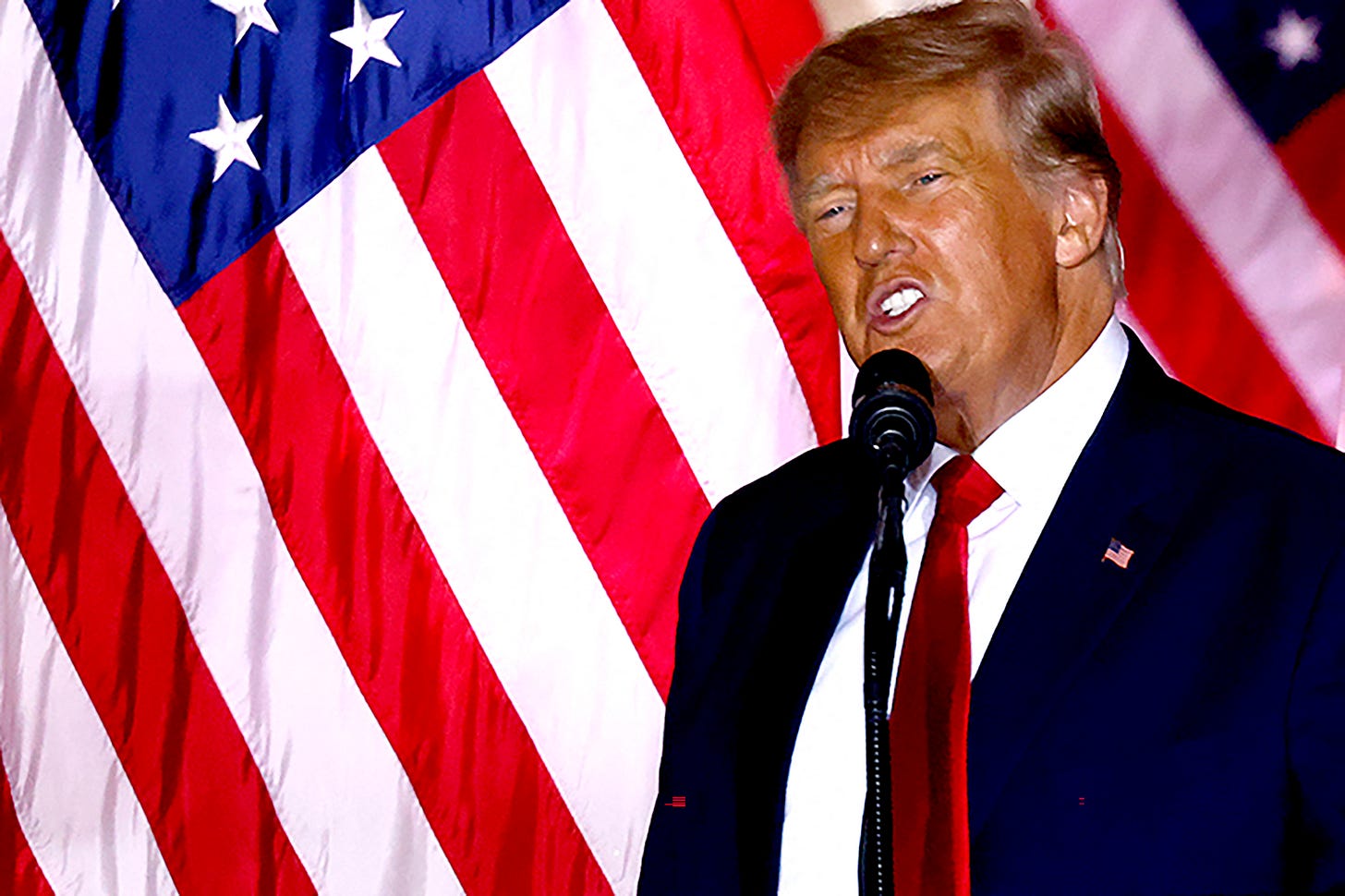What Everybody Knows
One man (along with his mob of dittoheads) is entirely to blame for bringing our nation to the brink

You’d think the proprietor of a newsletter devoted to analyzing the political right would have something big, bold, and new to say about the conclusion of the House Select Committee to Investigate the January 6th Attack on the United States Capitol, including its approval of four criminal referrals to the Justice Department against former President Donald Trump.
But I really don’t.
Indeed, on the subject I find myself in the rare position of wanting to let Senate Minority Leader Mitch McConnell speak for me. Asked on Monday about the committee’s conclusions with regard to the events of January 6, 2021, McConnell said this: “The entire nation knows who is responsible for that day. Beyond that, I don’t have any immediate observations.”
I like that statement and am tempted to endorse it. But it turns out that, unlike McConnell, I do have a handful of observations to offer—because his imputation of guilt is only partially right.
Trump in Global Context
The entire nation—indeed, the entire world—knows who is largely responsible for what happened on January 6, because everyone knows the events of the preceding two months and those of the subsequent two years. Throughout all of it, former president Donald Trump has lied over and over again about the indisputable fact that he lost the 2020 election. It was that repeated lie, mixed with ancillary lies about the forces behind the voter fraud that supposedly robbed him and his supporters of victory, that precipitated the insurrection on Capitol Hill—an event that amounted to an attempted self-coup on the part of the president.
That makes the American situation categorically different than any other in the world since the antiliberal right began its current electoral surge.
Right-wing populists have governed, currently govern, or soon will govern in a wide range of countries, from Brazil to Israel, Italy to India. Not all of these parties have faced an electoral test of the kind Trump failed so spectacularly at the end of 2020. And some of them—like Viktor Orbán’s Fidesz Party in Hungary, for example—do what they can to give themselves an electoral advantage by exerting control over the media, engaging in gerrymandering, and pursuing other forms of (in most cases, marginal) vote manipulation. Still, the fact remains that, among the right-wing populists, only Trump has attempted to defy the outcome of a free and fair election in order to keep himself in power. The rest have been willing, more or less, to abide by liberal-democratic rules for the transfer of power and conferral (and removal) of political legitimacy.
Lots of ominous and interesting things follow from this observation.
It may mean, for one thing, that liberal democracy is in worse shape (more vulnerable) in the United States than elsewhere in what is often called the free world. It may also mean that the global surge of right-wing populism doesn’t constitute an inevitable threat to the liberal-democratic order. It may merely represent a shift of right-leaning parties (and the voters who favor them) somewhat further right from where they used to position themselves.
That’s obviously significant for the process of policy formation and implementation, and if it went further, it could transform these parties into vehicles for outright anti-liberal or anti-democratic policies. But a party moving a few clicks to the right doesn’t necessarily constitute a threat to liberal democracy as a form of government.
The American Exception
Yet if things are uniquely dangerous in the United States, the question is why. I can think of two reasons.
To begin with, right-wing populism has yet to win a majority or plurality of the popular vote in a nationwide contest in the U.S. In most countries, this would have kept it from ever winning power. Yet Trump won the 2016 election because of the way his vote total interacted with America’s idiosyncratic 18th-century institutions and electoral rules, which make it possible to prevail in the Electoral College while winning fewer votes than a rival. (In 2016, to be precise, 2.9 million fewer.) Four years later, the country came less than 100,000 votes in 3-4 states from the same thing happening again, despite Trump losing the nationwide popular vote by 7 million.
This counter-majoritarian possibility lends an air of legitimacy to those who would defy the outcome of an election: We won while “losing” in 2016, so why not again in 2020? Just because we fell short in one respect doesn’t mean we didn’t actually come out on top in another.
But even if American institutions and rules make the U.S. system more unstable (under certain conditions) than those in other democracies, the events of January 6 depended on the introduction of an additional variable as a catalyst—and that is Donald Trump’s narcissism and malevolence. Trump simply couldn’t face his own loss—or rather, he couldn’t face admitting his own loss in public—and avoiding that humiliation was more important to him even than the fate of American self-government. If getting himself declared the winner required overturning the rule of law and liberal democracy in the United States, that was fine with him.
Which brings us back to McConnell’s statement on Monday: “The entire nation knows who is responsible for that day.” Indeed, we all know that Trump was responsible. No Trump, no January 6.
Trump’s Accomplices
Keep reading with a 7-day free trial
Subscribe to Notes from the Middleground to keep reading this post and get 7 days of free access to the full post archives.


